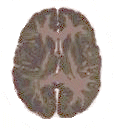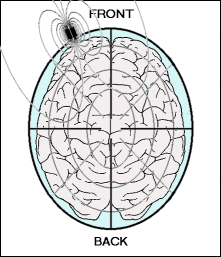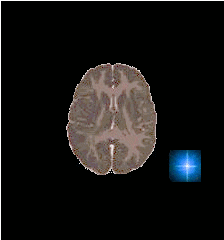 |
| Shiva
Neural |
| Stimulation
Technology |
|
TECHNICAL DISCUSSION
 |
This
illustration only approximates the actual 'binding
factor'.
|
 |
|
Circumcerebral
magnetic stimulation (like "The Octopus" and Shiva
Neural Technology) are designed to interact with one of the
brain's most important electrical activities. The brain has
waves of activity from front to back (or rostral to caudal).
These occur every 25 milliseconds, giving them a frequency
of forty hertz  . This activity is present when we're awake and when we're asleep
and dreaming, but it's not there when we're in dreamless
sleep, a coma, or when we're unconscious . This activity is present when we're awake and when we're asleep
and dreaming, but it's not there when we're in dreamless
sleep, a coma, or when we're unconscious  . .
The states when this 40 hertz activity is present are also the states
in which we're capable of having experiences and creating memories
that we can remember later on. For this reason, the front to back
40 hertz activity has been called the "Binding Factor" for
consciousness. |
Unusual sensory and cognitive modalities
(those which are either rare among individuals or occurring only
in rare moments for most individuals) can be accessed by disrupting
the binding factor, which can act to inhibit perceptions and cognitive qualia that
we don't ordinarily experience.
The coils are arranged to present the
signals in a counterclockwise pattern. The signal is moved from
one location to the next, dividing it into eight segments, which
change in length by a few milliseconds each time the signal moves
from one pair of coils to the next. The amount of the change in
the length of each segment is designed to avoid the exact times
that appear with the binding factor, so they are slightly 'out of
tune' with it. The result is a state that doesn't appear within
the repertoire of normal, ordinary states of consciousness, the
states your brain is accustomed to working in.
A good metaphor for this would be to compare
Shiva to bicycle brakes, with your brain's binding factor in the role
of the wheels. The difference between the 25 millisecond gaps separating
each instance of the binding factor can be compared to the speed reductions
you put in with each tap on the brakes. If you ride a bike, you know
that even small taps on the brakes can cut your speed rapidly. This
approach interacts with the binding factor and uses it's own natural
momentum. Just as a bicycle can only go in one direction, Shiva enhances
only one of the many 'directions' your consciousness can take. In favor
of right-hemispheric processes.
. |
. |
 . .
|
EEG
monitoring of subjects receiving the Octopus showed
that the right hemisphere responded significantly more
than the left.
The binding factor moves from front to back, while Shiva moves the
signals around the head counterclockwise.
The result is that the left side's binding factor is parallel to
the movement of the signals, while the right side's signals run in
the opposite direction. The right side has it's binding factor disrupted
more than the left.
Unusual perceptions and cognitions dominated by right hemispheric
process are more likely to emerge. These are primarily non-verbal
cognitive processes and perceptions that don't easily go into words. |
| . |
|

|
Theta
activity was specifically
targeted in the first generation of this technology
when Persinger "calculated the derivatives or
changes in frequency shifts in electroencephalographic
frequencies around 6 Hz would involve increments of
20 to 25 milliseconds"  , which includes the time period that appears in the 40 Hz signal.
One study found that the largest changes in power spectra
occurred between 4 and 7 Hz, the low theta band. , which includes the time period that appears in the 40 Hz signal.
One study found that the largest changes in power spectra
occurred between 4 and 7 Hz, the low theta band.
This explains why, of all possible capacities in one could imagine
being enhanced through neural stimulation, psychic phenomena emerged
as significant in laboratory studies with circumcerebral neural stimulation. |
The association of psychic and paranormal phenomena and perception
with theta and low theta activity has been known for decades,
and is validated in the Octopus
studies. Theta activity
specifically associates with activity in the hippocampus, a
deep brain structure. The hippocampus works in cognition, spatial
perception, and many aspects of memory. On the right, it's
instrumental in inner imagery, and contextualization. The hippocampus
responds more than any other deep brain structures because
the brain's theta (hippocampal) response comes not from the
stimulation, but from the brain's natural response to it.
The hippocampus on the right can, without
using words, experience a fragment of a perception, find a context
that fits for it, and extrapolate a 'meaning' for it. If that perception
is of a qualia apprehended from another brain's magnetic activity,
then a psychic perception will have taken place.
Now we can see how psychic perceptions
can be reported in scientific experiments with circumcerebral magnetic
brain stimulation. How psychic skills themselves work is another
question, discussed here.
The next thing to consider is the intention
of the individual, which is discussed on another
page where people who want to develop their psychic skills
are encouraged to try to pay attention to very short duration qualia.
The extreme brevity of the temporal windows for psychic perception
suggests that they may find their inception in the brief intervals
between instances of the binding factor. The hypothesis to explain
this is that the Binding Factor ordinarily inhibits perception of
information embedded in magnetic fields, including the geomagnetic
one, as well as magnetic signals originating from the electrical
activity of other brains.
|


 .
. 